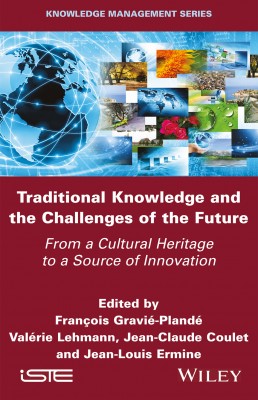
Edited by
François Gravié-Plandé, University of Limoges (IAE Limoges), France.
Valérie Lehmann, Université du Québec à Montréal, Canada.
Jean-Claude Coulet, Consultant, France.
Jean-Louis Ermine, Institut Mines-Télécom Business School, France.
Traditional activities, such as art and heritage crafts, certain agricultural and culinary professions, as well as various ancestral practices, represent major socio–economic challenges today. Ancient knowledge, faced with the rapid transformation of economic and ecological ecosystems, as well as cultural and social systems, is confronted with unprecedented issues, particularly in terms of preservation, transmission and promotion. Against this backdrop, we need to examine emerging approaches to the sustainable management of this knowledge.
This book is based on a four-year series of seminars attended by professionals and academics from several disciplines. It looks at the issue of traditional knowledge from a variety of perspectives – economic, historical, pedagogical, financial, institutional, technological and managerial – and is based on concrete experiences in several French countries and regions.
Traditional Knowledge and the Challenges of the Future, which is both informed by firsthand accounts and forward-looking reflections, offers an original perspective on the relationship between cultural heritage and innovation. It offers researchers, practitioners and decision-makers a fresh perspective on the potential of traditional knowledge in a changing world.
Part I. Preserving Traditional Knowledge.
1. Developing Competence in Traditional Occupations: The Valuable Role of Documentary Filmmaking, Jean-Claude Coulet.
2. The Extimization of Traditional Hoof Trimming Knowledge and the Basis of Its Acquisition, Mathilde Dumas Leroux, Joffrey Beaujouan, Sophie Chauvat, Géraldine Riz-Livré, and Michel Recopé.
3. Knowledge Management in the Restoration of Historic Buildings, Jean-Louis Ermine, Jérôme Chouli, Benoit Le Blanc, and Guilhem Le Meigne.
4. A Method for Modeling Knowledge to Preserve Cultural Heritage, Imane El Amrani, Abdelmajid Saka, and Nada Matta.
5. Distilling Cognac and Analyzing Global Distilling Cultures to Preserve the Living Memory of Traditional Knowledge, Vanessa Feré.
Part 2. Transmission of Traditional Knowledge.
6. The Problem of Passing On Traditional Knowledge, Jean-Claude Coulet.
7. Supporting Industrial Heritage and Local Know-How to Benefit Regional Development: The Case of Terre et Fils, Benjamin Cabanes, Juliette Kehane, Laure Lignon, and Pierre Bertrand.
8. The Regional Campus for Built Heritage: From Restoration to Eco-Construction, A Tool for Combining Tradition and Innovation Within Territories, Sophie Seica and Mickael Landemaine.
9. From Traditional Knowledge to Agroecological Knowledge, Vincent Sulignac and Matthieu Hirsch.
10. Knowledge Transfer Within Agricultural Cooperatives in Morocco: Types of Barriers and Opportunities for Improvement, Rachid Elkachradi.
11. The Role of Digital Technology in Enhancing the Value of Luxury Artisanship, Benjamin Adam, François Gravier-Plandé, and Martine Hlad-Rispal.
12. Initiation and Traditional Knowledge Transmission Through Compagnonnage, Jean Erceau, Dominique Saffre, and Jean-Louis Ermine.
Part 3. Valorization and Creation Associated with Traditional Knowledge.
13. From Transmission of Traditional Knowledge to Pedagogical Innovation, Valérie Lehmann and Valérie Culieub.
14. The Craft Masonry Heater, Aurélien Germain-Thomas.
15. Knowledge Management in Quebec’s Forest Mushroom Industry: Knowledge Rebuilt, Laurent Renard and Martin Cloutier.
16. Rebuilding an Industrial Commodity Chain Through Know-How in a Traditional Sector: Case Study of the 1083 Jeans Brand, Juliette Kehane and Benjamin Cabanes.
17. The Territorial Social Ecosystem as a Solution for the Transmission and Promotion of Traditional Knowledge, François Gravier-Plandé.
18. Cognac’s Time-Honored Traditional Know-How and Modest Innovations, Bertrand Blancheton.
François Gravié-Plandé is a lecturer at the University of Limoges (IAE Limoges) and a researcher at CREOP, France. His research includes territorial entrepreneurship and the valorization of traditional knowledge.
Valérie Lehmann is full Professor at the Université du Québec à Montréal, Canada, and a part time professor at Sciences Po Lyon, France. She is an expert in participative projects and open innovation, and a facilitator in change management.
Jean-Claude Coulet is an honorary teacher–researcher in psychology, specializing in individual and collective skills, and their development in training and organizations.
Jean-Louis Ermine is Professor Emeritus at the Institut Mines-Télécom Business School, France, and a researcher and expert consultant for companies in the field of knowledge management.